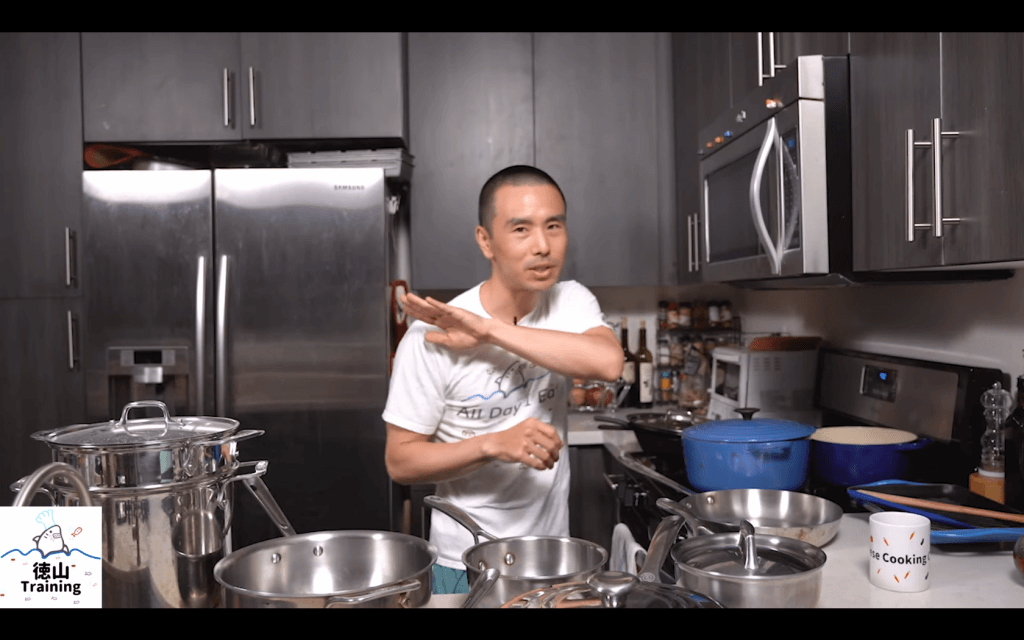As an Amazon Associate, I earn from qualifying purchases
Stainless steel cookware may take longer to heat up and can create hot spots, potentially causing uneven cooking and affecting the dish’s taste and quality. Additionally, badly scratched stainless steel pans can expose you to chemicals that may cause health issues.
On the positive side, stainless steel cookware is highly durable and can withstand high temperatures and abrasive cooking utensils. It is a popular choice for those who prefer nonstick surfaces for delicate foods like eggs and fish but may not be suitable for high-heat cooking.
While stainless steel may leach heavy metals into food, this is more likely when cooking acidic foods. Overall, stainless steel cookware has its advantages in terms of durability but needs to be used and maintained correctly to avoid potential health risks.

Credit: www.reddit.com
Table of Contents
TogglePros Of Using Stainless Steel Cookware
Stainless steel cookware offers durability, longevity, and is resistant to rust and corrosion. Its sleek appearance, ease of cleaning, and compatibility with induction cooktops make it a versatile choice for any kitchen.
Durability
Stainless steel cookware is highly durable, making it a long-lasting investment for your kitchen. It can withstand high temperatures and is resistant to scratches, dents, and staining. This means you can use metal utensils and cook with confidence, knowing that your cookware will withstand the test of time.
Versatility
One of the key advantages of stainless steel cookware is its versatility. It can be used on various heat sources, including gas, electric, and induction cooktops. Whether you’re boiling, frying, sautéing, or simmering, stainless steel cookware can handle it all. Its versatility allows you to cook a wide range of dishes without the need for multiple types of cookware.
Even Heat Distribution
When it comes to cooking, even heat distribution is essential for achieving perfectly cooked meals. Stainless steel cookware excels in this area, as it distributes heat evenly across the cooking surface. This ensures that your food is cooked uniformly without any hot spots. Whether you’re searing a steak or simmering a delicate sauce, stainless steel cookware will help you achieve consistent results every time.

Credit: www.alldayieat.com
Cons Of Using Stainless Steel Cookware
When it comes to using stainless steel cookware, there are several drawbacks to consider. Some of the key cons include poor heat conductivity, the risk of hot spots, and the potential for leaching heavy metals.
Poor Heat Conductivity
Stainless steel is not a good conductor of heat, leading to uneven cooking and longer heating times, which can impact the overall cooking experience.
Risk Of Hot Spots
Cooking with stainless steel may result in hot spots on the cookware’s surface, causing food to burn or cook unevenly, affecting the taste and quality of your dishes.
Potential For Leaching Heavy Metals
There is a risk of heavy metals, such as chromium and nickel, leaching into your food from poorly maintained or scratched stainless steel cookware, potentially leading to health issues.
Considering these drawbacks, it’s essential to be mindful of how you use and maintain your stainless steel cookware to minimize these potential risks.
Health Risks Of Stainless Steel Cookware
Stainless steel cookware has a few health risks to consider. It is not a good conductor of heat, leading to potential hot spots and uneven cooking. Additionally, scratched stainless steel pans can expose you to harmful substances like chromium and nickel.
Health Risks of Stainless Steel Cookware Exposure to Chromium and Nickel Stainless steel cookware contains chromium and nickel, which, when present in high amounts, may cause health issues. Over time, poorly maintained or damaged cookware can result in the release of these metals into food, leading to potential health risks for individuals with sensitivities to nickel or chromium.Risk of Dermatitis For individuals sensitive to nickel, exposure to high levels of this metal from stainless steel cookware can lead to skin conditions like dermatitis. When nickel comes into direct contact with the skin, it may cause redness, itching, or inflammation, resulting in discomfort and potential health concerns.Chemicals Seeping into Food Certain older or damaged stainless steel cookware may allow chemicals to seep into food. When the protective layer of the cookware is compromised, it can result in the leaching of harmful substances into the food being prepared, posing potential health risks for consumers.In summary While stainless steel cookware is durable and useful for many cooking tasks, it’s important to be mindful of potential health risks associated with its use. By maintaining cookware properly and being aware of sensitivities to nickel and chromium, consumers can mitigate these risks and continue to enjoy the benefits of stainless steel cookware.For more details on the pros and cons of using stainless steel cookware, check out our full guide here. Reference: Pros and Cons of Using Stainless Steel Cookware – [Your website name]:max_bytes(150000):strip_icc()/Best-Stainless-Steel-Cookware-Sets-FW-tout-1c6f2bac9d3c43158899784a3374e9ce.jpg)
Credit: www.foodandwine.com
Tips For Using Stainless Steel Cookware
Stainless steel cookware is a popular choice for its durability, versatility, and sleek appearance. However, using it properly is crucial to ensure longevity and optimal cooking results. Below are some essential tips to maximize the benefits of your stainless steel cookware.
Avoiding Scratches
To prevent scratches on your stainless steel cookware, it’s important to use wooden or silicone utensils instead of metal ones. Metal utensils can mar the surface of the cookware, leading to potential damage and diminished performance. Additionally, avoid stacking stainless steel cookware inside each other as this can cause scratches and wear.
Proper Cleaning And Maintenance
When cleaning stainless steel cookware, use warm, soapy water and a soft sponge to remove food residue and stains. To maintain the luster of the cookware, consider using a stainless steel cleaner occasionally. Always ensure the cookware is completely dry before storing to prevent water spots and staining. Proper maintenance will extend the lifespan of your stainless steel cookware.
Cooking Techniques
Stainless steel cookware distributes heat evenly, making it suitable for various cooking techniques such as searing, browning, and sautéing. However, it’s important to preheat the cookware before adding ingredients to ensure even heat distribution. Additionally, avoid overcrowding the cookware to allow proper circulation of heat. Learning the appropriate cooking techniques will help you make the most of your stainless steel cookware.
Frequently Asked Questions Of Pros And Cons Of Using Stainless Steel Cookware
What Is The Downside Of Cooking On Stainless Steel?
Cooking on stainless steel has a few downsides. Stainless steel is not a good conductor of heat, so it may take longer to heat up and create hot spots. This can cause food to burn or cook unevenly. Additionally, badly scratched stainless steel pans may expose you to harmful chemicals.
What Are The Side Effects Of Stainless Steel Cookware?
Side effects of stainless steel cookware include potential exposure to chromium and nickel from scratched pans, which may lead to health issues like dermatitis and contamination of food with chemicals from old or burned cookware.
When Should You Not Use A Stainless Steel Pan?
Avoid using stainless steel pans when cooking highly acidic foods or delicate items, as they can cause leaching of metals into the food and may not provide even heat distribution, leading to burning or uneven cooking. Additionally, stainless steel is not suitable for high-heat cooking.
Is It Better To Cook With Stainless Steel Or Nonstick?
Stainless steel is better for high-heat cooking and is highly durable, while nonstick is best for delicate foods like eggs. Stainless steel may leach heavy metals into food, especially with acidic dishes, but it’s still a good choice for most cooking needs.
Conclusion
Stainless steel cookware offers durability and versatility but may lead to uneven cooking. Consider the trade-offs carefully based on your cooking needs and preferences. Overall, stainless steel can be a great option for your kitchen arsenal.
As an Amazon Associate, I earn from qualifying purchases

